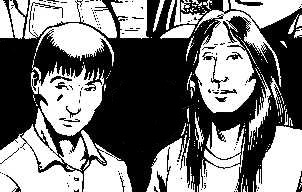 Peace Party Comics features Native American warriors as the heroes
Peace Party Comics features Native American warriors as the heroes
By John Hopkins, Pequot Times Staff writer
Robert V. Schmidt is always happy to talk about PEACE PARTY, his dazzling new comic book that features Native American heroes.
The two young Hopi-Pueblo cousins tackle everything from prejudice to pollution; and even find time to battle the supernatural and supervillains. PEACE PARTY is an on-going publication of Blue Corn Comics.
Schmidt, a non-Native, is eager to show Indians in a positive light. It's the right thing to do he says – and it might help him deal with the shame of knowing he had ancestors involved in an infamous New England slaughter of a peaceful Indian village.
"To me it's just a fascinating connection – one of those weird synchronicity things. An ancestor of mine was involved in the (Rhode Island) Great Swamp Fight, a lineage of Quakers, and now I'm doing a Native-themed comic called PEACE PARTY," Schmidt said. "There's some sort of cosmic justice there."
The Great Swamp Massacre took place on Dec. 19, 1675, a Sunday, when the United Colonies (except for Rhode Island) launched surprise attack on the Narragansetts' winter encampment during King Philip's War. (The Narragansetts had refused to join the English, preferring to remain neutral in the war). As many as 1,000 Native people – mostly women and children – were either burned alive in their wigwams or killed as they fled across the frozen swamp.
Ironically, the other part of his lineage – the Quakers – were known for their peaceful ways and were often referred to as "Friends."
"How did I get into this? Short answer: I've long been interested in comic books," Schmidt said. He combined that with an interest in "ancient" cultures (Egyptian, Greek, Mayan, etc.); and America's socio-cultural conflicts.
"The so-called culture wars," he said. "I thought a comic on our own indigenous people would provide a thought-provoking contrast to the usual mindless action fare."
Schmidt has been researching and developing his idea since the early 1990s. The first two-issues of PEACE PARTY came out in 1999 to tremendous reviews from comic book fans and the Native community, he said.
"Alas, the comic-book industry was in a slump and we didn't have the resources to market our book properly, so we had to suspend publication," Schmidt said. "Since then we've building word-of-mouth for our endeavor while working on more stories."
A former business programmer/analyst for Northrop Corporation and a library systems analyst for the Los Angeles Times, Schmidt – a WASP – has been a freelance writer since 1993.
Another PEACE PARTY contributor is Patrick Rolo, a Bad River Chippewa, whose comic book credentials include illustrations for "Nightmare on Elm Street," "Mortal Kombat" and "Iron Man."
Danny Donovan, a Cherokee, works on the scripts for PEACE PARTY and the penciler and inker is veteran graphic artist Rob Davis.
The 32-page PEACE PARTY comic book has a color cover and black and white interior. It is distributed through Diamond Comic Distributors. The board of advisors consists of Native American experts that review each story for accuracy and sensitivity toward Native Americans.
Ten percent of the profits from PEACE PARTY are donated to various native charities, including Futures for Children, The American Indian College Fund, The First Nations Development Fund and The Hopi Foundation.
PEACE PARTY stars two Hopi/Pueblo cousins, Billy Honanie and Drew Quyatt. They are ordinary humans who have been selected by the gods to be superheroes.
Billy's an urban Indian, a lawyer, who's out of touch with his heritage. Drew's a reservation Indian, an artist, who's deeply connected to his heritage.
Reconciling their differences, which represent the Native duality of "living in two worlds," is the heart of the series, Schmidt said.
PEACE PARTY is not the first comic book to feature Native Americans in predominant roles. Others have included "Turok, Son of Stone," "The Lone Ranger and Tonto," "Big Chief Wahoo" and "Redskin."
There have also been comics that featured real-life Indian leaders such as Crazy Horse, Geronimo and Tecumseh. It may be the first to display sensitivity toward Native feelings and culture.
"If I can find a publisher or the funds to self-publish, we plan to do a PEACE PARTY graphic novel," Schmidt said. "The industry is recovering and people have begun hearing about us, so we hope it'll be a hit."
The web address is wwwbluecorncomics.com.
John Christian Hopkins is a member of the Narragansett Tribal Nation in Rhode Island, a member of the Native American Journalist Association and is staffwriter at the Pequot Times in Mashantucket, Connecticut. His email is jhopkins@mptn.org.
